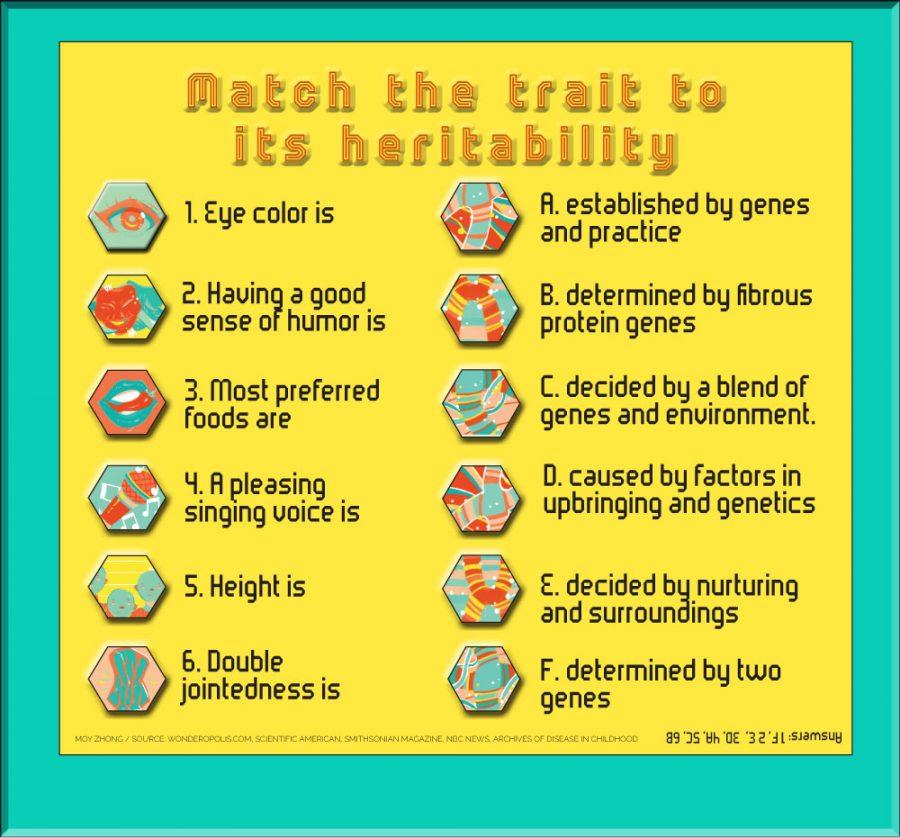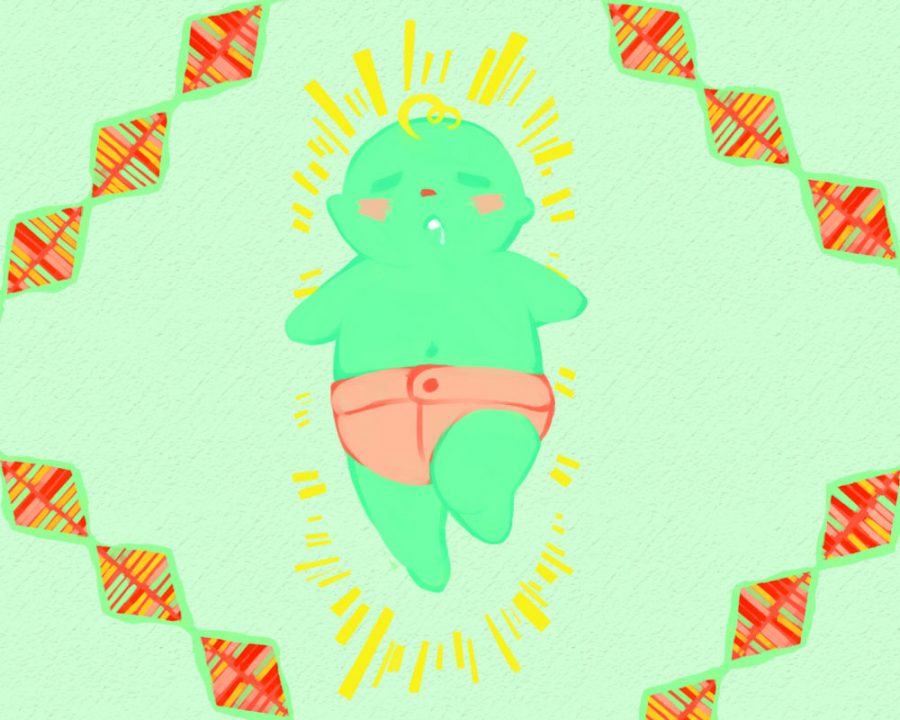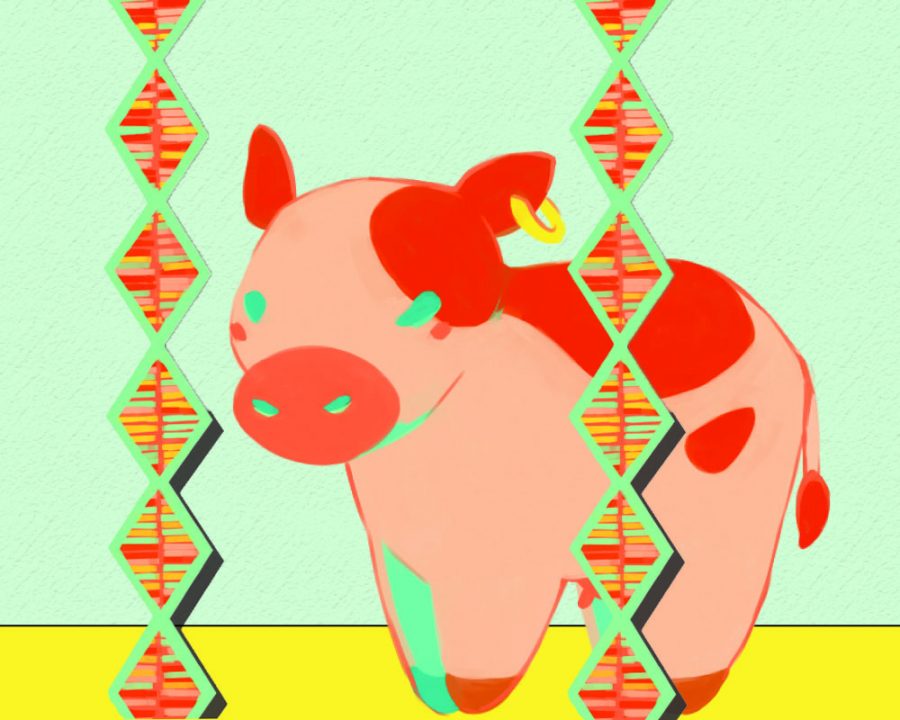Art by Moy Zhong
One might define good genes as having a fast metabolism, athletic talent or the charming good looks of a movie star. What many people don’t initially consider to be on their most desired genes list, along with straight teeth and the predisposition to age well, are genetic qualities that set a select few apart from the rest of the population.
“I heard a song that I really liked from a movie, so I went home and picked it out on the piano. My mom plays piano and was super surprised that I had learned it in the right key, so she thought I might have had perfect pitch,” Snyder said. “I found out for sure at the beginning of freshman year when some friends and I were messing around, and every song they played for me I was able to play back correctly.”
Sophomore Bradley Snyder knows what it’s like to be different from those around him thanks to a trait called absolute pitch, which one in every 10,000 people have. Commonly known as perfect pitch, the anomaly involves the ability to identify or sing a musical note after hearing it. Those who have this skill have one or both of the two types of perfect pitch: active, which means they can hum or sing back a note after hearing it, or passive, meaning that they can’t sing back a note but can identify it. Snyder, who has both active and passive perfect pitch, discovered his talent around the age of five.
“I heard a song that I really liked from a movie, so I went home and picked it out on the piano. My mom plays piano and was super surprised that I had learned it in the right key, so she thought I might have had perfect pitch,” Snyder said. “I found out for sure at the beginning of freshman year when some friends and I were messing around, and every song they played for me I was able to play back correctly.”
Learning that he had the trait inspired Snyder to become more involved in music. He takes piano lessons and is also learning to play the guitar and the trumpet. He said he would like to take vocal lessons in the near future as well.
Although researchers are not fully certain whether or not perfect pitch is inherited, some factors suggest that it is. For example, the phenomenon is more prevalent among populations of European Jews, Indians and East Asians. Researchers at the University of California in San Francisco have concluded that in order to have perfect pitch, one must be genetically predisposed and have begun formal music training before or by age six.
Nobody in Snyder’s family is as musically gifted as he is, although his mom does play the piano. Because of the rarity of this ability, Snyder considers himself lucky to have the trait and all of the opportunities that come with it.
“People usually think it’s pretty cool [that I have perfect pitch], and they usually don’t believe me so they test me. It’s kind of fun,” Snyder said. “It’s also awesome if I want to join a band, because usually people will let me play with them when they hear I have perfect pitch.”
“I think [when people talk about good genes], they are generally referring to alleles, or forms of a gene that differ among individuals in a population, when they admire the attractive person or curse the male pattern baldness they got from their maternal grandfather or often a set of alleles that combined for a polygenic effect for some phenotype like long legs,” Dr. Criscitiello said.
While perfect pitch and other helpful genetic anomalies can help provoke one’s musical talent and be an interesting conversational topic, Dr. Michael Criscitiello, an associate professor at the Texas A&M University’s Department of Veterinary Medicine and Biomedical Sciences, thinks of truly good genes as pertaining more to one’s health rather than appearance.
“I think [when people talk about good genes], they are generally referring to alleles, or forms of a gene that differ among individuals in a population, when they admire the attractive person or curse the male pattern baldness they got from their maternal grandfather or often a set of alleles that combined for a polygenic effect for some phenotype like long legs,” Dr. Criscitiello said. “There are a few alleles that could I choose for my child to have or not have, I certainly would. For example, an allele with well-defined mutations in the ‘breast cancer gene’, BRCA1, is generally considered a ‘bad’ gene as it clearly and significantly increases risk of the disease.”
Some examples of good genes, Dr. Criscitiello said, include a variant of the CCR5-delta 32 gene, which gives protection against HIV and bubonic plague. He also noted that there are ups and downs associated with most genes. For instance, certain alleles that promote cancer later in life promote reproductive success much earlier. Ultimately, if an allele comes with no negative cost over generations, it usually evolves to be nearly 100 percent prevalent in a population. When this happens, said allele is no longer considered a good gene; it is just the most frequent allele for the gene in question.
“We aren’t all that similar. We have different personalities and look different. However I sometimes find others treating me like I am the same person as my siblings,” Koller said. “We are not more genetically similar than other siblings. We do share a lot of the same interests and abilities, just like other siblings.”
Individuals who have a twin or two are often familiar with the idea of frequent alleles, as twins, triplets and even quadruplets can have identical DNA. Freshman Erin Koller, a fraternal quadruplet, said she and her siblings are not that similar despite common misconceptions. Like Snyder’s perfect pitch, being a quadruplet garners surprise and attention; people Koller tells usually think she and her siblings are two sets of twins. Despite being part of such a genetic rarity, Koller sometimes feels as if the opposite were true.
“We aren’t all that similar. We have different personalities and look different. However I sometimes find others treating me like I am the same person as my siblings,” Koller said. “We are not more genetically similar than other siblings. We do share a lot of the same interests and abilities, just like other siblings.”
Dr. Criscitiello also disputed the assumption that with today’s modern technology and genetic engineering, bad traits will eventually disappear because, as previously mentioned, “bad” alleles often come with an up side. In addition to that, the environment will never cease to change — this not only refers to climate, but also toxins, resources, pathogens and competition as well. Lastly, spontaneous mutations occur randomly and consistently, which means they can eliminate any potential of inheriting a good gene.
Despite his opinion that the term “good genes” refers mostly to alleles that promote health and survival, Dr. Criscitiello acknowledges the fact that humans are programmed to be attracted to other humans with desirable qualities, visible or not.
“Sexual selection is always working whether we like to admit it or not. For example, my eyes are arrested by a shapely woman with a pretty face at the beach because unbeknownst to my consciousness, my genetic program is assessing clear skin suggesting low pathogen burden, facial symmetry suggesting no congenital developmental abnormalities, curves suggesting a wide pelvis facilitating childbirth and breasts for nurturing young,” Dr. Criscitiello said. “Her alleles for relatively rare red hair may even give my offspring the same opportunity to catch eyes on the beach one day decades later.”
Even though there is no certainty as to whether or not perfect pitch pertains to physical attraction, it has definitely brought Snyder a lot of attention and advantages. One of those advantages has included the opportunity to perform gigs around Columbia with a band called the Blue Hearts Club. He said he enjoyed getting to know other talented musicians and doesn’t think they would have let him perform with them if he wasn’t able to play by ear.
“I think [having perfect pitch] is awesome, but it’s a little overrated. I mean, I can know exactly what I’m supposed to play, but I’m definitely limited by my technical ability. I only started taking lessons for piano a little less than a year ago, and my form is awful from years of trying to play piano with incorrect hand positions,” Snyder said. “But I love music, and having perfect pitch has made it really easy for me to express myself. I feel really lucky and grateful to have it.”
Do you have any interesting natural traits? Leave a comment below.
















































































